外研版(2019)选择性必修 第一册Unit 2 Onwards and upwards Period 2 Using Language课件(共21张)
文档属性
| 名称 | 外研版(2019)选择性必修 第一册Unit 2 Onwards and upwards Period 2 Using Language课件(共21张) |  | |
| 格式 | zip | ||
| 文件大小 | 45.5MB | ||
| 资源类型 | 教案 | ||
| 版本资源 | 外研版(2019) | ||
| 科目 | 英语 | ||
| 更新时间 | 2022-08-27 11:47:43 | ||
图片预览

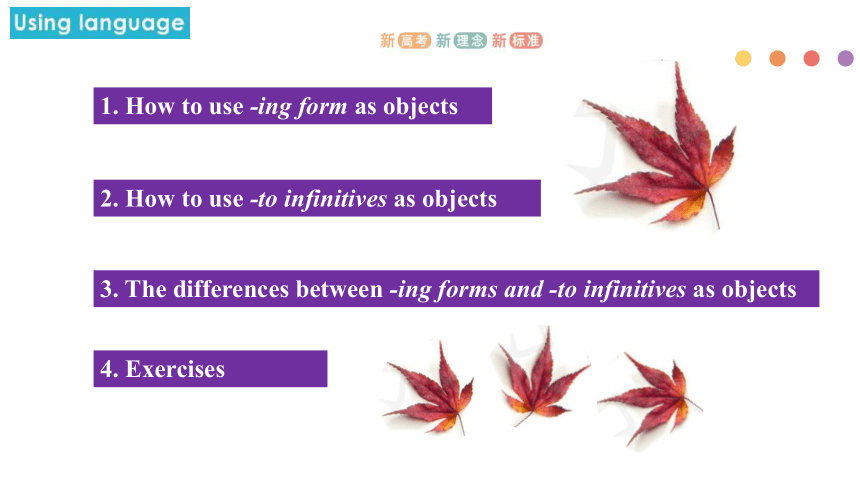
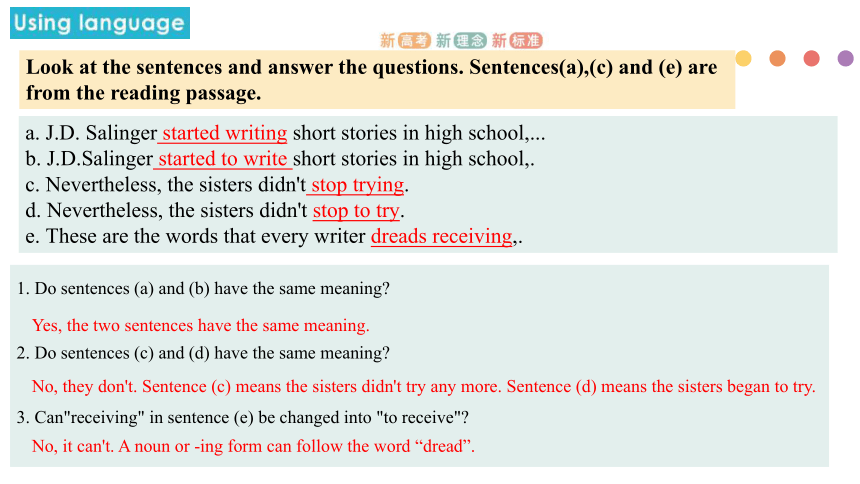
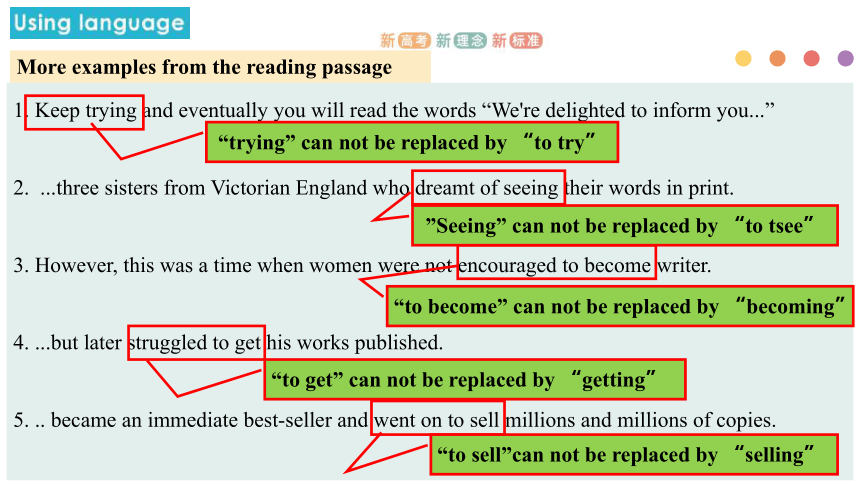
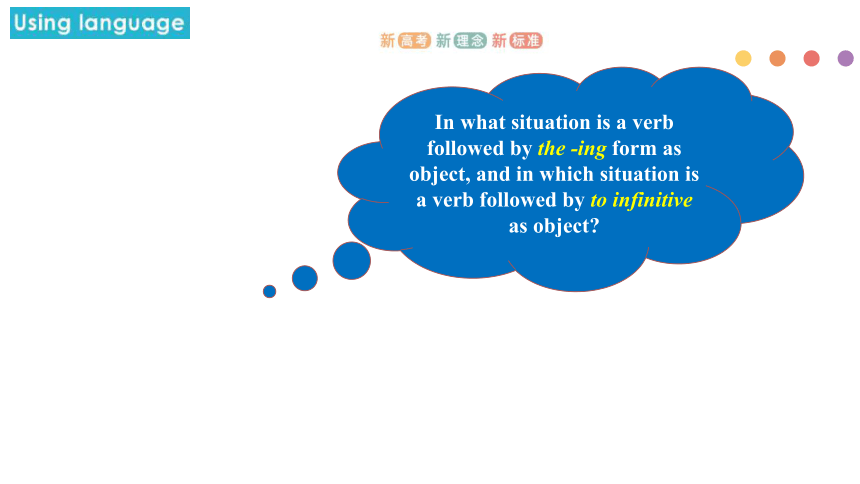
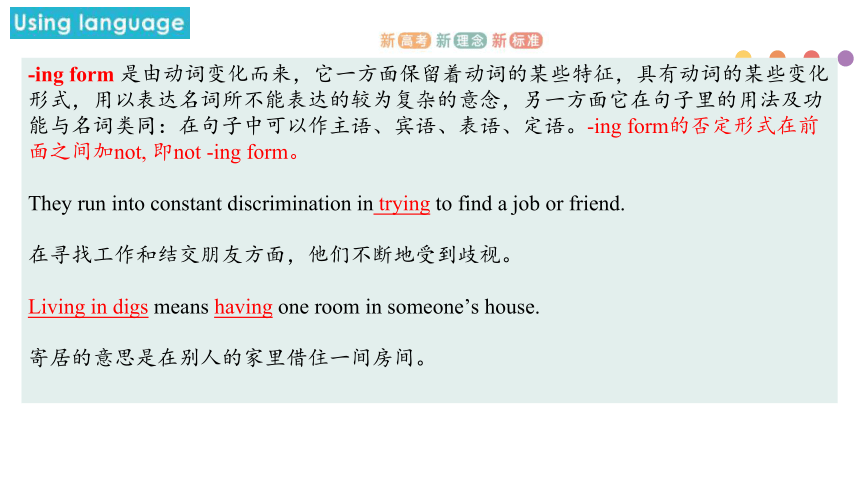
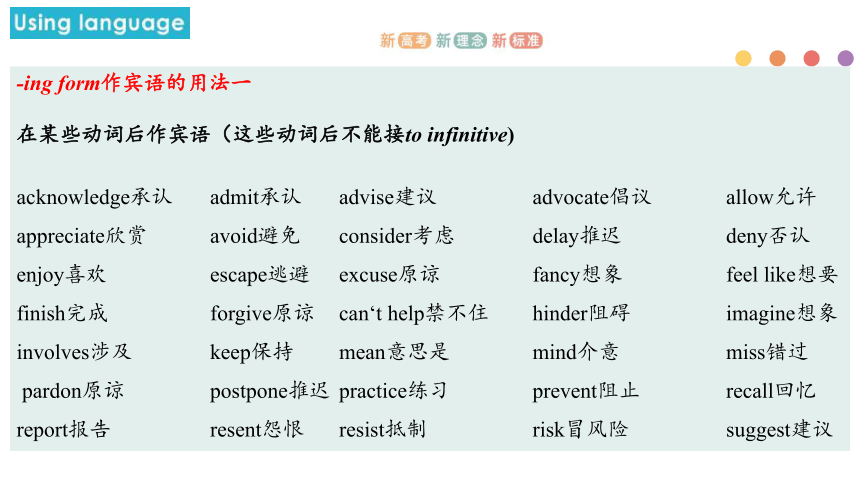
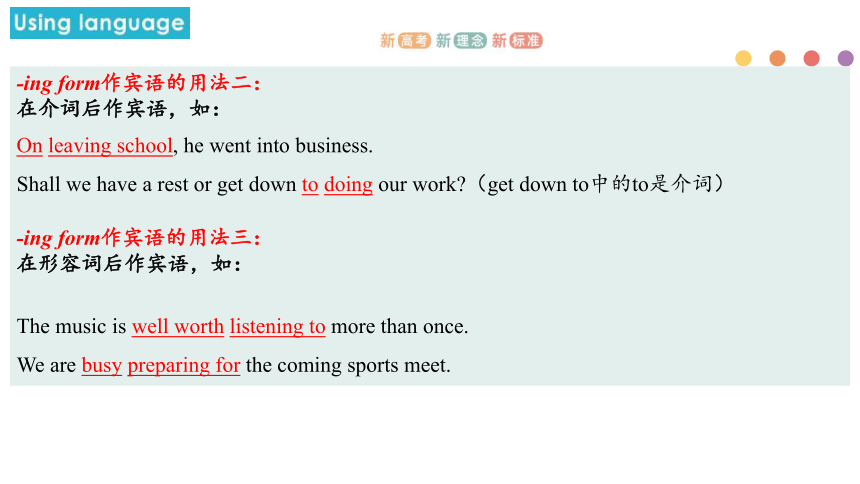
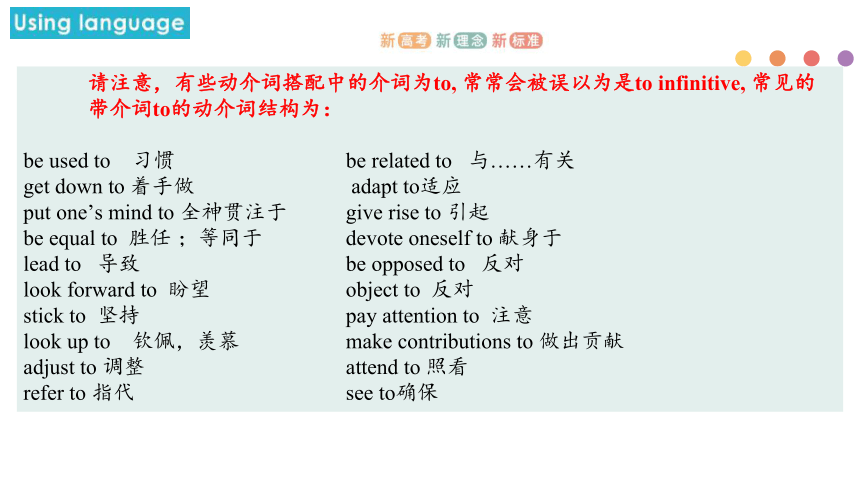
文档简介
(共21张PPT)
Period 2 Using Language
1. How to use -ing form as objects
2. How to use -to infinitives as objects
3. The differences between -ing forms and -to infinitives as objects
4. Exercises
Look at the sentences and answer the questions. Sentences(a),(c) and (e) are from the reading passage.
a. J.D. Salinger started writing short stories in high school,...
b. J.D.Salinger started to write short stories in high school,.
c. Nevertheless, the sisters didn't stop trying.
d. Nevertheless, the sisters didn't stop to try.
e. These are the words that every writer dreads receiving,.
1. Do sentences (a) and (b) have the same meaning
2. Do sentences (c) and (d) have the same meaning
3. Can"receiving" in sentence (e) be changed into "to receive"
Yes, the two sentences have the same meaning.
No, they don't. Sentence (c) means the sisters didn't try any more. Sentence (d) means the sisters began to try.
No, it can't. A noun or -ing form can follow the word “dread”.
More examples from the reading passage
1. Keep trying and eventually you will read the words “We're delighted to inform you...”
2. ...three sisters from Victorian England who dreamt of seeing their words in print.
3. However, this was a time when women were not encouraged to become writer.
4. ...but later struggled to get his works published.
5. .. became an immediate best-seller and went on to sell millions and millions of copies.
“trying” can not be replaced by “to try”
”Seeing” can not be replaced by “to tsee”
“to become” can not be replaced by “becoming”
“to get” can not be replaced by “getting”
“to sell”can not be replaced by “selling”
In what situation is a verb followed by the -ing form as object, and in which situation is a verb followed by to infinitive as object
-ing form 是由动词变化而来,它一方面保留着动词的某些特征,具有动词的某些变化形式,用以表达名词所不能表达的较为复杂的意念,另一方面它在句子里的用法及功能与名词类同:在句子中可以作主语、宾语、表语、定语。-ing form的否定形式在前面之间加not, 即not -ing form。
They run into constant discrimination in trying to find a job or friend.
在寻找工作和结交朋友方面,他们不断地受到歧视。
Living in digs means having one room in someone’s house.
寄居的意思是在别人的家里借住一间房间。
-ing form作宾语的用法一
在某些动词后作宾语(这些动词后不能接to infinitive)
acknowledge承认 admit承认 advise建议 advocate倡议 allow允许 appreciate欣赏 avoid避免 consider考虑 delay推迟 deny否认
enjoy喜欢 escape逃避 excuse原谅 fancy想象 feel like想要finish完成 forgive原谅 can‘t help禁不住 hinder阻碍 imagine想象involves涉及 keep保持 mean意思是 mind介意 miss错过
pardon原谅 postpone推迟 practice练习 prevent阻止 recall回忆report报告 resent怨恨 resist抵制 risk冒风险 suggest建议
-ing form作宾语的用法二:
在介词后作宾语,如:
On leaving school, he went into business.
Shall we have a rest or get down to doing our work (get down to中的to是介词)
-ing form作宾语的用法三:
在形容词后作宾语,如:
The music is well worth listening to more than once.
We are busy preparing for the coming sports meet.
请注意,有些动介词搭配中的介词为to, 常常会被误以为是to infinitive, 常见的 带介词to的动介词结构为:
be used to 习惯 be related to 与……有关
get down to 着手做 adapt to适应
put one’s mind to 全神贯注于 give rise to 引起
be equal to 胜任 ;等同于 devote oneself to 献身于
lead to 导致 be opposed to 反对
look forward to 盼望 object to 反对
stick to 坚持 pay attention to 注意
look up to 钦佩,羡慕 make contributions to 做出贡献
adjust to 调整 attend to 照看
refer to 指代 see to确保
1. They went on ___________(walk) and never stopped __________(talk).
3. Mark often attempts to escape ______________(fine)being fined whenever he breaks traffic regulations.
4. He got well prepared for the job interview, for he couldn't risk _________(lose) the good opportunity.
5. —Robert is indeed a wise man .
—Oh, yes. How I have regret ______________(not take) his advice !
6. Shortly after ___________(suffer) from a massive earthquake and ________________
(reduce) to ruins, the city took on a new book.
walking
talking
being fined
losing
not taking
suffering
being reduced
1.When Peter speaks in public, he always has trouble___________(think) of the right things
to say.
2. While shopping, people sometimes can't help ________________ (persuade) into buying s
something they don't really need.
3. I'm looking forward to _________ (see) you this summer vacation.
4. I had great difficulty _________ (find) the suitable desk in that restaurant because there
were so many people.
5. —Mr and Mrs White bought a tent just now.
—Oh,they are considering_________ (go)camping this weekend.
6. I can’t imagine Tom _________ (do) the work alone.
thinking
being persuaded
seeing
finding
going
doing
to infinitive 动词不定式是指动词中的一种不带词形变化从而不指示人称、数量、时态的一种非谓语动词形式,表示的意义多为“打算”“计划”“希望”“将要做某事”等表示未来的或未做的事,而-ing form表示正在进行,一般性或经常性发生的行为。动词不定式的否定形式在前面之间加not, 即not to infinitive。
The driver failed to see the other car in time. 司机没能及时看见另一辆车。
I happen to know the answer to your question. 我碰巧知道你那个问题的答案。
to infinitive 作宾语的用法一
在某些动词后作宾语(这些动词后不能接-ing form)
afford付得起 agree同意 aim力求做到 appear显得 arrange安排
ask要求 attempt 试图 want想要 choose决定 claim声称
decide决定 demand要求 determine决心 endeavor竭力 expect期待
fail未能够 hesitate犹豫 hope希望 learn学会 manage设法
neglect疏忽 offer主动提出 plan计划 prepare准备 pretend假装
promise答应 prove证明 refuse拒绝 resolve决心 seem觉得好像
swear发誓 tend往往会 threaten威胁 volunteer自愿做 wish希望
to infinitive 作宾语的用法二
动词+疑问词+不定式,如:
Please show us how to do that.
There are so many kinds of tape-recorders on sale that I can't make up my mind which to buy.
to infinitive 在以下动词后面作宾语
动词+宾语+不定式(to do)
advise建议 allow允许 believe相信 cause导致 challenge挑战
compel强迫 declare宣布 encourage鼓励 forbid禁止 force强迫
hire雇佣 induce引诱 instruct指导 invite邀请 like喜欢
order命令 permit允许 persuade说服 remind提醒 request要求
require要求 select挑选 send派遣 suppose认为 tell告诉
train训练 urge敦促
Father will not allow us to play on the street.
We believe him to be guilty.
-ing form 和to infinitive在同一个动词后面作宾语的区别
1. 在start,begin,love,like,prefer,hate,intend这些动词后面既可以接-ing form也
可以接to infinitive,意义没有区别。
2. 在以下动词后面既可以接-ing form也可以接to infinitive,意义有区别:
remember to do 记得去做某事
remember doing 记得做过某事
forget to do 忘记去做某事
forget doing 忘记做过某事
stop to do 停下来去做某事
stop doing 停止做某事
go on to do 继续做某事(另外一件事)
go on doing 继续做某事(同一件事)
regret to do 遗憾地去做某事
regret doing 后悔做过某事
try to do 尽力去做某事
try doing 尝试做某事
mean to do 打算去做某事
mean doing 意味着/意思是做某事
can't help to do 不能帮忙做某事
can't help doing 禁不住做某事
1. I can't think of __________(go) to visit her in hospital without _____________(buy) some flowers.
2. The examiner gave the students some time___________(think).
3. The play is programmed ____________ (start) at 7 a.m, so we have decided ___________(meet) at 6:30.
4. I am looking forward to ___________ (see) the film again.
5. I intend ___________ (study) English ___________ (understand) American business methods.
6. She still plans ___________ (marry) him even afte he refused ___________ (buy) her an engagement ring.
7. I can not resist ___________(eat) fish and chips when I am in England.
8. She enjoys ___________(go) to parties and ___________ (dance) in the discos all the night long.
9. I stopped ___________(live) in London when I realized it was time for me ___________ (move).
10. Don't forget ___________(turn) off the heating before ___________(leave) the house.
going
buying
to think
going
to start
to meet
seeing
to study
to understand
to marry
to buy
eating
going
dancing
living
to turn
to move
leaving
11. I understand ___________ (buy) red roses for your girl friend on St. Valentine's Day was a bit old-fashion. 12. You should think about___________ (save) until you have enough money.
13. We all dislike ___________ (work) even though we are all angry ___________ (spend) money on
___________(have) a good time and ___________(get) the things we want.
14. You mustn't mind ___________(take) trouble over the cooking if you want your guests ___________ (enjoy)
a good meal.
15. I like ___________ (watch) the clouds at sunset because it seems ___________(relax).
16. I enjoy ___________ (visit) the Internet cafe on my way home ___________(check) my e-mails and
maybe ___________(surf) the net for a while.
17. ___________(Eat) apples is better for you than ___________(drink) fizzy orange juic.
18. I meant ___________(buy) some croissants before ___________(leave).
19. Don't hesitate ___________(ask) me if you have any questions.
20. ___________(Be) honest, she told me all her stories.
buying
saving
working
to spend
having
getting
taking
to enjoy
watching
relaxing
visiting
checking
surfing
Eating
drinking
to buy
leaving
to ask
To be
1. I got on the bus and found a seat near the back, and then I noticed a man________(sit)
at the front.(2017年广东)
2. If you find something you love doing outside of the office, you'll be less likely
__________ (bring) your work home.(2016年全国卷Ⅱ)
3. I __________(allow) to get close to these cute animals at the 600-acre centre.
(2016年全国卷Ⅰ)
4. Fast food________(be) full of fat and salt;by_________(eat) more fast food people
will get more salt and fat than they need in their diet.(2017年全国卷Ⅰ)
高考链接
sitting
to bring
was allowed
is
eating
At the age of ten, Liu Wei lost both his arms in an accident.
Despite this, he wanted ___________(live) life to the full.
He learnt ___________ (use) his feet for everyday actities,
such as eating and brushing his teeth. He also started
___________(swim) and won two gold medals at the
National Games for People with Disabilities. When he had to
stop___________ (swim) due to health problems, he decided ___________(learn) how to play the piano with his toes. It was difficult, but he kept ___________ (practise) until he had achieved his goal. In 2010, he won in China's Got Talent and became famous nationwide. Today, Liu Wei still enjoys ___________ (play) music, and his positive attitude is an inspiration to us all.
to live
to use
to swim
swimming
to learn
practising
playing
感谢您的观看
Period 2 Using Language
1. How to use -ing form as objects
2. How to use -to infinitives as objects
3. The differences between -ing forms and -to infinitives as objects
4. Exercises
Look at the sentences and answer the questions. Sentences(a),(c) and (e) are from the reading passage.
a. J.D. Salinger started writing short stories in high school,...
b. J.D.Salinger started to write short stories in high school,.
c. Nevertheless, the sisters didn't stop trying.
d. Nevertheless, the sisters didn't stop to try.
e. These are the words that every writer dreads receiving,.
1. Do sentences (a) and (b) have the same meaning
2. Do sentences (c) and (d) have the same meaning
3. Can"receiving" in sentence (e) be changed into "to receive"
Yes, the two sentences have the same meaning.
No, they don't. Sentence (c) means the sisters didn't try any more. Sentence (d) means the sisters began to try.
No, it can't. A noun or -ing form can follow the word “dread”.
More examples from the reading passage
1. Keep trying and eventually you will read the words “We're delighted to inform you...”
2. ...three sisters from Victorian England who dreamt of seeing their words in print.
3. However, this was a time when women were not encouraged to become writer.
4. ...but later struggled to get his works published.
5. .. became an immediate best-seller and went on to sell millions and millions of copies.
“trying” can not be replaced by “to try”
”Seeing” can not be replaced by “to tsee”
“to become” can not be replaced by “becoming”
“to get” can not be replaced by “getting”
“to sell”can not be replaced by “selling”
In what situation is a verb followed by the -ing form as object, and in which situation is a verb followed by to infinitive as object
-ing form 是由动词变化而来,它一方面保留着动词的某些特征,具有动词的某些变化形式,用以表达名词所不能表达的较为复杂的意念,另一方面它在句子里的用法及功能与名词类同:在句子中可以作主语、宾语、表语、定语。-ing form的否定形式在前面之间加not, 即not -ing form。
They run into constant discrimination in trying to find a job or friend.
在寻找工作和结交朋友方面,他们不断地受到歧视。
Living in digs means having one room in someone’s house.
寄居的意思是在别人的家里借住一间房间。
-ing form作宾语的用法一
在某些动词后作宾语(这些动词后不能接to infinitive)
acknowledge承认 admit承认 advise建议 advocate倡议 allow允许 appreciate欣赏 avoid避免 consider考虑 delay推迟 deny否认
enjoy喜欢 escape逃避 excuse原谅 fancy想象 feel like想要finish完成 forgive原谅 can‘t help禁不住 hinder阻碍 imagine想象involves涉及 keep保持 mean意思是 mind介意 miss错过
pardon原谅 postpone推迟 practice练习 prevent阻止 recall回忆report报告 resent怨恨 resist抵制 risk冒风险 suggest建议
-ing form作宾语的用法二:
在介词后作宾语,如:
On leaving school, he went into business.
Shall we have a rest or get down to doing our work (get down to中的to是介词)
-ing form作宾语的用法三:
在形容词后作宾语,如:
The music is well worth listening to more than once.
We are busy preparing for the coming sports meet.
请注意,有些动介词搭配中的介词为to, 常常会被误以为是to infinitive, 常见的 带介词to的动介词结构为:
be used to 习惯 be related to 与……有关
get down to 着手做 adapt to适应
put one’s mind to 全神贯注于 give rise to 引起
be equal to 胜任 ;等同于 devote oneself to 献身于
lead to 导致 be opposed to 反对
look forward to 盼望 object to 反对
stick to 坚持 pay attention to 注意
look up to 钦佩,羡慕 make contributions to 做出贡献
adjust to 调整 attend to 照看
refer to 指代 see to确保
1. They went on ___________(walk) and never stopped __________(talk).
3. Mark often attempts to escape ______________(fine)being fined whenever he breaks traffic regulations.
4. He got well prepared for the job interview, for he couldn't risk _________(lose) the good opportunity.
5. —Robert is indeed a wise man .
—Oh, yes. How I have regret ______________(not take) his advice !
6. Shortly after ___________(suffer) from a massive earthquake and ________________
(reduce) to ruins, the city took on a new book.
walking
talking
being fined
losing
not taking
suffering
being reduced
1.When Peter speaks in public, he always has trouble___________(think) of the right things
to say.
2. While shopping, people sometimes can't help ________________ (persuade) into buying s
something they don't really need.
3. I'm looking forward to _________ (see) you this summer vacation.
4. I had great difficulty _________ (find) the suitable desk in that restaurant because there
were so many people.
5. —Mr and Mrs White bought a tent just now.
—Oh,they are considering_________ (go)camping this weekend.
6. I can’t imagine Tom _________ (do) the work alone.
thinking
being persuaded
seeing
finding
going
doing
to infinitive 动词不定式是指动词中的一种不带词形变化从而不指示人称、数量、时态的一种非谓语动词形式,表示的意义多为“打算”“计划”“希望”“将要做某事”等表示未来的或未做的事,而-ing form表示正在进行,一般性或经常性发生的行为。动词不定式的否定形式在前面之间加not, 即not to infinitive。
The driver failed to see the other car in time. 司机没能及时看见另一辆车。
I happen to know the answer to your question. 我碰巧知道你那个问题的答案。
to infinitive 作宾语的用法一
在某些动词后作宾语(这些动词后不能接-ing form)
afford付得起 agree同意 aim力求做到 appear显得 arrange安排
ask要求 attempt 试图 want想要 choose决定 claim声称
decide决定 demand要求 determine决心 endeavor竭力 expect期待
fail未能够 hesitate犹豫 hope希望 learn学会 manage设法
neglect疏忽 offer主动提出 plan计划 prepare准备 pretend假装
promise答应 prove证明 refuse拒绝 resolve决心 seem觉得好像
swear发誓 tend往往会 threaten威胁 volunteer自愿做 wish希望
to infinitive 作宾语的用法二
动词+疑问词+不定式,如:
Please show us how to do that.
There are so many kinds of tape-recorders on sale that I can't make up my mind which to buy.
to infinitive 在以下动词后面作宾语
动词+宾语+不定式(to do)
advise建议 allow允许 believe相信 cause导致 challenge挑战
compel强迫 declare宣布 encourage鼓励 forbid禁止 force强迫
hire雇佣 induce引诱 instruct指导 invite邀请 like喜欢
order命令 permit允许 persuade说服 remind提醒 request要求
require要求 select挑选 send派遣 suppose认为 tell告诉
train训练 urge敦促
Father will not allow us to play on the street.
We believe him to be guilty.
-ing form 和to infinitive在同一个动词后面作宾语的区别
1. 在start,begin,love,like,prefer,hate,intend这些动词后面既可以接-ing form也
可以接to infinitive,意义没有区别。
2. 在以下动词后面既可以接-ing form也可以接to infinitive,意义有区别:
remember to do 记得去做某事
remember doing 记得做过某事
forget to do 忘记去做某事
forget doing 忘记做过某事
stop to do 停下来去做某事
stop doing 停止做某事
go on to do 继续做某事(另外一件事)
go on doing 继续做某事(同一件事)
regret to do 遗憾地去做某事
regret doing 后悔做过某事
try to do 尽力去做某事
try doing 尝试做某事
mean to do 打算去做某事
mean doing 意味着/意思是做某事
can't help to do 不能帮忙做某事
can't help doing 禁不住做某事
1. I can't think of __________(go) to visit her in hospital without _____________(buy) some flowers.
2. The examiner gave the students some time___________(think).
3. The play is programmed ____________ (start) at 7 a.m, so we have decided ___________(meet) at 6:30.
4. I am looking forward to ___________ (see) the film again.
5. I intend ___________ (study) English ___________ (understand) American business methods.
6. She still plans ___________ (marry) him even afte he refused ___________ (buy) her an engagement ring.
7. I can not resist ___________(eat) fish and chips when I am in England.
8. She enjoys ___________(go) to parties and ___________ (dance) in the discos all the night long.
9. I stopped ___________(live) in London when I realized it was time for me ___________ (move).
10. Don't forget ___________(turn) off the heating before ___________(leave) the house.
going
buying
to think
going
to start
to meet
seeing
to study
to understand
to marry
to buy
eating
going
dancing
living
to turn
to move
leaving
11. I understand ___________ (buy) red roses for your girl friend on St. Valentine's Day was a bit old-fashion. 12. You should think about___________ (save) until you have enough money.
13. We all dislike ___________ (work) even though we are all angry ___________ (spend) money on
___________(have) a good time and ___________(get) the things we want.
14. You mustn't mind ___________(take) trouble over the cooking if you want your guests ___________ (enjoy)
a good meal.
15. I like ___________ (watch) the clouds at sunset because it seems ___________(relax).
16. I enjoy ___________ (visit) the Internet cafe on my way home ___________(check) my e-mails and
maybe ___________(surf) the net for a while.
17. ___________(Eat) apples is better for you than ___________(drink) fizzy orange juic.
18. I meant ___________(buy) some croissants before ___________(leave).
19. Don't hesitate ___________(ask) me if you have any questions.
20. ___________(Be) honest, she told me all her stories.
buying
saving
working
to spend
having
getting
taking
to enjoy
watching
relaxing
visiting
checking
surfing
Eating
drinking
to buy
leaving
to ask
To be
1. I got on the bus and found a seat near the back, and then I noticed a man________(sit)
at the front.(2017年广东)
2. If you find something you love doing outside of the office, you'll be less likely
__________ (bring) your work home.(2016年全国卷Ⅱ)
3. I __________(allow) to get close to these cute animals at the 600-acre centre.
(2016年全国卷Ⅰ)
4. Fast food________(be) full of fat and salt;by_________(eat) more fast food people
will get more salt and fat than they need in their diet.(2017年全国卷Ⅰ)
高考链接
sitting
to bring
was allowed
is
eating
At the age of ten, Liu Wei lost both his arms in an accident.
Despite this, he wanted ___________(live) life to the full.
He learnt ___________ (use) his feet for everyday actities,
such as eating and brushing his teeth. He also started
___________(swim) and won two gold medals at the
National Games for People with Disabilities. When he had to
stop___________ (swim) due to health problems, he decided ___________(learn) how to play the piano with his toes. It was difficult, but he kept ___________ (practise) until he had achieved his goal. In 2010, he won in China's Got Talent and became famous nationwide. Today, Liu Wei still enjoys ___________ (play) music, and his positive attitude is an inspiration to us all.
to live
to use
to swim
swimming
to learn
practising
playing
感谢您的观看
